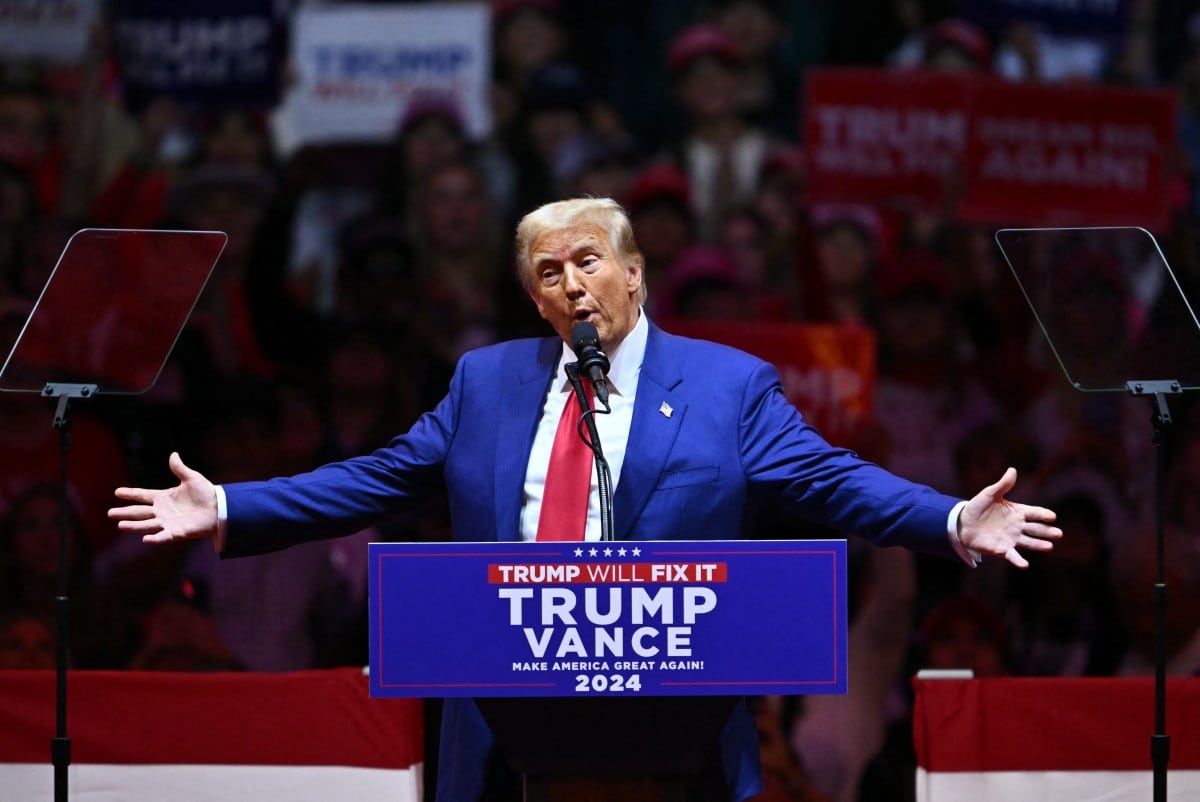Anatomy of a Trump rally

Former US President and Republican presidential candidate Donald Trump gestures as he speaks during a campaign rally at Madison Square Garden in New York, October 27, 2024. —Photo by Angela Weiss/Agence France-Presse
ATLANTA, Georgia — After dozens of stops across the country, Republican presidential candidate Donald Trump’s campaign rallies have taken on the meticulous choreography of a ritual.
Here is a breakdown of how the event usually plays out, using the example of a recent rally in Georgia.
Act I: Arrivals – To get a chance of seeing the former president up close and personal, his most ardent supporters arrive five, six, even seven hours in advance.
They are met by vendors selling T-shirts and baseball caps bearing the Republican candidate’s likeness. While in line, they chant “Fight! Fight! Fight!” and raise their fists—an homage to Trump surviving an assassination attempt at a Pennsylvania rally in July.
When the doors open, the crowd rushes into the venue, in this case a college basketball arena in Atlanta.
Among the attendees is Tikva Mann, an 83-year-old Israeli-American woman, who is overjoyed at the prospect of seeing her first Trump rally.
“If he is all the way over there to the other side, it doesn’t matter as long as I get to see him,” she told Agence France-Presse (AFP).
Act II: The openers
The rally begins four hours before Trump takes the stage, opening with a prayer.
Attendees remove their red caps, recite the US Pledge of Allegiance, and listen to the national anthem.
A number of opening speakers take to the podium, each of whom showers the former president with praise, assuring the crowd he will “save America” from economic inflation, a migrant “invasion” and leftist ideology.
As is often the case, Trump is late to his scheduled appearance, but his supporters don’t care, as they pass the time by singing along to the preshow playlist with music by Pitbull, Elvis Presley and Miley Cyrus.
While they wait, a young man in a sky-blue polo shirt makes his way through the crowd, asking: “Do you wanna sign Elon Musk’s petition?”
The richest man on Earth has been holding a contest in recent days while campaigning for the Republican, offering to give $1 million a day at random to a registered voter who signs the petition.
Act III: The Trump show
The crowd erupts into a roar as Trump finally takes the stage as the ultrapatriotic anthem “God Bless the USA” starts to play.
Attendees sing along to the song, which opens each of Trump’s rally speeches, while he takes to the podium, surrounded by Secret Service agents.
“Let me start by asking you a very simple question: Are you better off now than you were four years ago?” Trump asks the crowd.
“No!” the arena shouts in response.
Though the Atlanta rally was planned to focus on inflation, Trump makes a speech almost exclusively about immigration.
Painting a dark portrait of the United States, Trump accuses migrants of kidnapping children and raping young American girls.
The crowd, meanwhile, responds effusively to Trump’s speech, laughing at his imitation of Democratic rival Kamala Harris and yelling “we love you!” and “finish the wall,” in reference to his proposal for the US-Mexico border.
“You got to get out and vote,” he urges over an hour into an often rambling speech. In return, he promises to make America “strong,” “proud” and “great.”
As the speakers begin playing the song “YMCA,” Trump raises his fists and begins dancing a bit. His supporters dance along, forming the letters corresponding to the song with their arms, before filing out of the arena.
Act IV: What next?
For some attendees, this was far from their first rodeo.
Eric Villacis has been to 15 other Trump events, describing them as “a love fest.”
The 40-year-old shrugs off accusations of Trump supporters being racist, instead saying the rallies are filled with “people of every single color, everybody getting along together.”
Trump himself echoes this sense of community during his speech, already speaking with a hint of nostalgia as the campaign nears its end.
“We’ve had the greatest rallies in the history of the world,” he says.